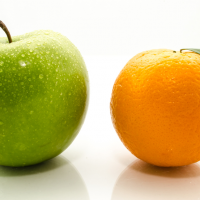Why We Shouldn’t Compare Grief

In an effort to sympathize, empathize, or just relate to grieving friends and family, we often compare their grief to a time in our own life when we were grieving. This process can yield some helpful results such as common ground or lessons learned from past experience, but all too often the results and side effects aren’t great.
When we compare grief it’s very easy to compare timelines as well. We want to compare our grief to others to see if the way we’re handling the current situation, or handled the past situation, was in line with cultural norms. The only problem is that you’re comparing apples and oranges because no two grief stories are the same.
The circumstances surrounding the death might appear to be similar, but the relationship individuals have with the deceased are never the same, nor are the ways our personalities have been conditioned to handle grief.
Say one of three brothers passes away. The other two brothers will deal with the loss in two very different ways, even though it appears they went through the exact same situation. One brother might be closer than the other, one brother might be more naturally prone to depression, and there’s a long list of other factors that contribute to how we process grief.
Comparing grief can cause us to be frustrated with others who don’t get over it as fast as we do or feel weak because we’re taking longer than others to adjust. Neither situation is conducive to coping with grief, so it’s best to avoid this practice.
Instead of comparing grief, try to focus on the why. Why are others dealing with grief the way they are? Why are you dealing with grief the way you are? You must answer these questions independently of each other. Only focus on one grief at a time.